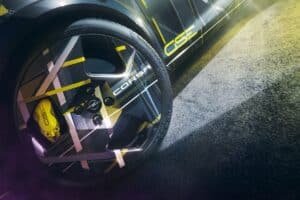A total of 43 chargers have been added, including a South Africa first 200 kW outlet at the Mall of Africa.

Having last year expanded its partnership with GridCars for the introduction of 33 electric vehicle charging stations across the country, Audi has entered into a joint partnership with Rubicon Energy for the rollout of 43 more charging points across the country.
New chargers
Claimed to accommodate a total of 57 electric vehicles charging simultaneously, the 43 points consist of 15 in Gauteng, 11 in the Western Cape, 10 in the Eastern Cape, four in KwaZulu-Natal, two in Mpumalanga and a single in the Free State, with the most powerful being the South Africa first 200 kW DC charger located at Mall of Africa in Midrand.
The added station will, therefore, increase the charging network to 70 with plans afloat for more stations in due course.
ALSO READ: GridCars and Audi add more charge to EV network
First for South Africa
Besides the 200 kW outlet, as well as the four 150 kW stations positioned along the N1, N2, N3 and N4, Ingolstadt’s second project phase – the tie-up with Rubicon and GridCars having been the first – will involve the introduction of four 100 kW chargers, eight 60 kW outlets, five 25 kW units and 22 kW AC stations at specifically selected points across the country.
This will bring the number of chargers headed by the automaker to 76, which will make-up 28% of the country’s entire electric vehicle charging network.
And load shedding?
“EVs are the future of mobility and we’re investing not just in hardware infrastructure, but in making electric mobility simpler and more widely available for South Africans, thus enabling the local EV market to grow,” Audi South Africa Head, Sascha Sauer, said.

“By fulfilling our promise from early 2022, we’re demonstrating our commitment to helping take South Africa into the future of mobility.”
Despite constant criticism against electric vehicles admits the current energy crisis, Sauer stated that, “while load shedding is a reality to which South Africans have become accustomed, it is worth pointing out that our charging network also capitalises on solar installations, where possible, to keep the charging stations optimally operational”.
Similarly, Rubicon Director of Energy, Greg Blandford, remarked it continues to see the importance of electric vehicles in South Africa as interest continues to rise in spite of the situation with Eskom.

“The global adoption of artificial intelligence, smart devices, greener technologies and carbon reduction initiatives has highlighted and accelerated the adoption of electric vehicles,” Blandford said.
“Local availability of more and more EVs, coupled with the increase in fossil fuel costs, will be a major catalyst for EV adoption in South Africa.”
The mentioned full array of 76 charging stations can be viewed here.
Support Local Journalism
Add The Citizen as a Preferred Source on Google and follow us on Google News to see more of our trusted reporting in Google News and Top Stories.






